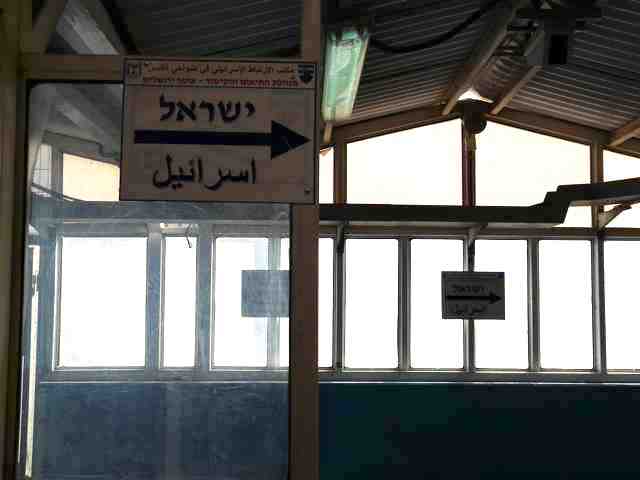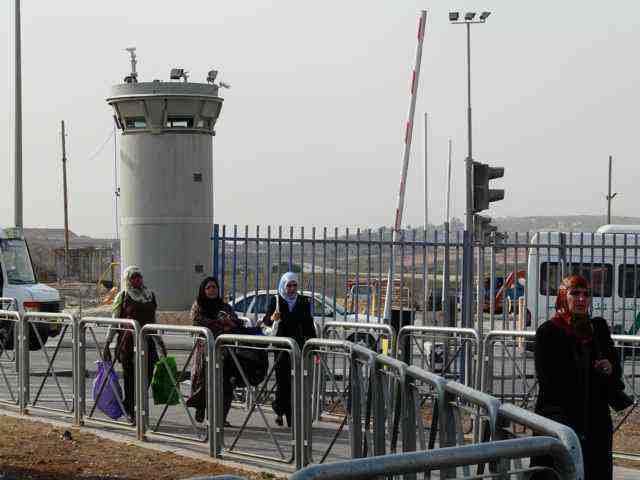 I was recently in Ramallah, and turned down the offer of a lift to Jerusalem in favour of taking the public bus – just to see what it was like (the luxuries of being a tourist). All traffic between Ramallah and Jerusalem has to pass through the Israeli military checkpoint at Qalandia (or Kalandiya, Qalandiya, etc). It was quite an experience. I’d suggest every tourist in Jerusalem should try it out for themselves. (I’m going to keep my commentary to a minimum here and let the pictures talk for me).
I was recently in Ramallah, and turned down the offer of a lift to Jerusalem in favour of taking the public bus – just to see what it was like (the luxuries of being a tourist). All traffic between Ramallah and Jerusalem has to pass through the Israeli military checkpoint at Qalandia (or Kalandiya, Qalandiya, etc). It was quite an experience. I’d suggest every tourist in Jerusalem should try it out for themselves. (I’m going to keep my commentary to a minimum here and let the pictures talk for me).
This (right) is one of the approaches to Qalandia.
Pictured below is a section of the ‘separation barrier‘ at Qalandia, decorated with murals.
This (below) is what you see on the road from Jerusalem into Ramallah, having passed through Qalandia. The painted sign says “No entry to Israelis” in Hebrew (Israeli citizens are forbidden from entering Ramallah, which is controlled by the Palestinian Authority).
Traffic trying to cross Qalandia from Ramallah into Jerusalem is often heavy.
Having left Ramallah, buses arrive at the entrance to Qalandia, where everybody has to get off with their bags, walk across a parking area and into this shed (below), to pass into a narrow barred passageway, wide enough for one person at a time.
Passengers from the bus are then corralled together in this holding pen (below). The barred turnstile at the far end is controlled by the Israeli army staff, who sit in a secure office just beyond: they allow one person at a time through the turnstile for checks. The rest must stand and wait. On the day I was there, I waited in this area for about 15 minutes, shuffling forward slowly one person at a time. People were courteous but quiet. Fortunately it was a cool day: there is no air-conditioning there.
This (below) is the notice on the other side of that turnstile: each person allowed through must pass their ID card (or, in my case, passport) through a transfer window for checking by the Israeli army staff.
I could not take photos of the ID check, but on that particular day, that particular office was staffed by four people – three women and one man – all in army uniform and all, in my estimation, in their late teens or early twenties. One was seated at the window, running computer checks on the ID of the people passing through the turnstile; as she worked, she also leaned back, smiling and chatting with her colleagues, who were lounging behind – one woman was reclining in an office chair with her boots up on the desk, while the man was seated on a desk nearby, his feet on a chair, chatting and laughing.
After I passed in front of the window, there was a sudden shouted command which came out of a speaker on the wall. I turned, the person who was coming just behind me shrank back, and the shout came again. The soldier at the window merely wanted me to show my passport again – but it was (how can I put this?) disconcerting, in that context, to have a disembodied voice suddenly issuing shouted commands at me through a crackly speaker.
After the ID check you walk on. Pictured below is the sign which hangs above this passageway; it says “Israel” in Hebrew and Arabic.
Turning right at the sign, as instructed, this is the view (below) – another turnstile.
Through that turnstile, you effectively enter Israel proper. This is the scene (below) – another watchtower, with more people and traffic waiting to pass into Ramallah.
Everybody reboarded the bus, which continued on its way into East Jerusalem.
For them, it was routine: they presumably do the same thing twice (or more) a day, every day. Perhaps, since the crossing only took about 20 minutes and nobody was singled out for body or property searches, it was a good trip.
It was the most shocking bus journey I’ve ever taken. Qalandia is a disgrace: it feels, looks and smells like a prison. The casual behaviour and jokey attitude of the Israeli soldiers running ID checks was disgusting. (Then again, perhaps it fits: imagine soldiers making eye-contact with everyone and smiling, saying please, thank you and have a nice day. It’s almost worse than the honest reality of treating people like cattle.)
And Qalandia is only one of dozens of similar military checkpoints, set up in and around the West Bank in order for Israel to control the movement of Palestinians.
It brutalises – but I wonder if it isn’t brutalising Israelis even more than Palestinians.
While I was waiting in that holding pen, it struck me that when Palestinians are one day governing themselves in a fully autonomous State of Palestine, Israelis will still be living with the insidious, corrupting mental and social consequences of having maintained such an occupation for so long.
I’m absolutely certain that the Palestinians can survive the occupation, however long it continues. They seem to have the kind of inner strength and collective resolve that no army can touch.
What I’m less sure about is whether the Israelis can.








